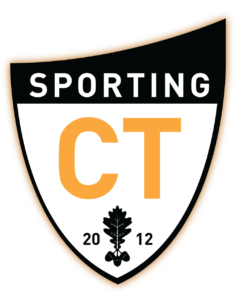Sporting CT
College Recruiting Info
We all want our players to lead fulfilling and healthy lives. At SportingCT our parents are no different. Watching your child follow his or her passion is beyond satisfying. It is a sensational feeling full of joy and fulfillment. That is what it feels like to have your student-athletes attend Sporting CT.
We care about all our players and parents and we want to help and prepare you for the college level if that's your goal. We have created a detailed High School Timeline so players and parents can follow and easily find the information they need to easily identify the right school fit.
General Information
We all want our players to lead fulfilling and healthy lives. At SportingCT our parents are no different. Watching your child follow his or her passion is beyond satisfying. It is a sensational feeling full of joy and fulfillment. That is what it feels like to have your student-athletes attend Sporting. We care about all our players and parents and we want to help and prepare you for the college level if that's your goal. We have created a detailed High School Timeline so players and parents can follow and easily find the information they need to easily identify the right school fit.
We always take our service to another level and as a result, we keep preparing ourselves to always serve you in the best way possible. When it comes to college recruiting this is not a 4 years choice, IT'S A LIFETIME DECISION. That's why it's important that we educate our players and parents to understand the differences in divisions so they can keep a broader perspective. Once student-athletes know what they want they will be closer in identifying the right school fit based on their academics and athletic abilities. If you have any questions please contact our College Pathway Director, Andrei Popescu at popescu8@hotmail.com.
Please feel free to look at the latest information released by NCAA:
- Academic Requirements and Core Courses
- Our Three Divisions
- Guide For The College Bound Student-Athlete
COLLEGE RECRUITING TIMELINE
FRESHMEN YEAR
-
Start planning now, take the right courses and get the best grades possible.
-
SIGN UP for a FREE profile page at EligibilityCenter.org for information on NCAA Eligibility.
Find your high school list of NCAA approved courses at EligibilityCenter.org/courselist.
Build a powerful resume and always keep it updated.
-
Your grades are crucial and be on top of it. If you are falling behind ask for help immediately.
-
Your high school will calculate your GPA, which will correspond with your class rank. Eventually, these statistics will be used to determine your admission into schools and potential academic scholarship.
-
Most colleges will use your grades from your “core” academic classes
-
Go watch local D1, D2, D3 college games to get an understanding of the different levels of college soccer in the United States
-
You are not only competing against local and state talent but also international players.
SOPHOMORE YEAR
- If you fall behind academically, ask your counselor for help finding approved courses you can take.
- Register for a Profile Page or Certification Account with the NCAA Eligibility Center at eligibilitycenter.org.
- At the end of the year, ask your counselor at each high school or program you attended to upload your official transcript to your NCAA Eligibility Center account.
-
Continue to focus on your grades and begin to challenge yourself with Honors and Advanced Placement (AP) classes and if your school offers it, Dual Enrollment classes where students can earn both high school and college credits.
-
Take the PSATs in the fall. Most area high schools will offer this test for free during the regular school day. This is a great opportunity for students to become accustomed to the test format and test length.
-
Contact college coaches of schools you may be interested in (see questions below for help) prior to college showcases and once your resume is in place.
-
College Showcase Tournaments will list the college coaches that will be attending that specific tournament:
-
Attend college ID clinics and summer camps of schools that you may be interested in (use the questions below as a guide)
-
Go watch local D1, D2, D3 college games to get an understanding of the different levels of college soccer in the United States.
-
Plan college visits and take tours of schools you may be interested in.
-
By the end of your sophomore year in high school, you should try to identify 20-30 potential schools that meet your academic and athletic aspirations.
-
If you know that you want to play Division I or Division II college soccer, register with the NCAA Eligibility Center at the beginning of your junior year. If you are unsure about what level you want to compete at you can still register
-
Always keep your options up until you commit.
-
Consider D3 schools as well because they can often time offer great academic packages.
JUNIOR YEAR
-
Continue to focus on your grades and begin to challenge yourself with Honors and Advanced Placement (AP) classes and if your school offers it, Dual Enrollment classes where students can earn both high school and college credits.
-
Your junior year is a very important year for your academics and a year that colleges will focus on when they examine your transcript, so continue to work hard and stay focused.
-
Register to take the SAT and/or the ACT tests
-
When you register for the SAT or ACT, you can have your scores sent directly to the NCAA Eligibility Center using the code 9999
-
Contact college coaches of schools you may be interested in (see questions below for help) prior to college showcases.
-
Structure your email to coaches and look at our photos below.
-
College Showcase Tournaments will list the college coaches that will be attending that specific tournament
-
Attend college ID clinics and summer camps of schools that you may be interested in (use the questions below as a guide)
-
Go watch local D1, D2, D3 college games to get an understanding of the different levels of college soccer in US or near you.
-
Plan college visits and take tours of schools you may be interested in.
-
By the end of your junior year in high school, you should try to identify 10-12 potential schools that you are seriously considering based on your academic and athletic aspirations.
-
Be proactive with the recruiting process and email coaches.
-
Time management is a skill that can be mastered and by now you should be able to have a good idea because you need to plan accordingly and stay on top of your work.
-
Consider both academics and athletics in your final decision and ask yourself “If I’m not playing soccer at this school, is this the school that I still want to be at?”. If you answered YES, then that's the school for you.

SENIOR YEAR
-
There is a misconception that colleges will not look at your senior year grades - this is very inaccurate. Your senior grades will be sent to the colleges you apply to and they will be factored into the admissions process. Stay focused and continue to work hard
-
At the beginning of your senior year, you should have your college search narrowed down to 2-5 schools that you are seriously considering
-
Confirm your eligibility status with the NCAA Clearinghouse at the start of your senior year
-
Register to take the SAT and/or the ACT tests in the fall
-
Meet with your guidance counselor, apply to the schools that you are seriously considering and ask selected teachers to write you a letter of recommendation. Be mindful of application deadlines as every school is different
-
Submit your FAFSA application. This determines how much aid you qualify to receive
-
Plan any final college visits and tours in the fall.
-
Contact any of the colleges that you are seriously considering prior to any event you could get scouted.
-
Follow up with all of the schools you are seriously considering and weigh your options before making your final decision.
-
Consider both academics and athletics in your final decision and ask yourself “If I’m not playing soccer at this school, is this the school that I still want to be at?”. If you answered YES, then that's the school for you.
- Complete your final NCAA- approved core courses as you prepare for graduation.
- Request your final amateurism certification beginning April 1 (fall enrollees) or Oct. 1 (winter/spring enrollees) in your NCAA Eligibility Center account at eligibilitycenter.org.
- After you graduate, ask your counselor to upload your final official transcript with proof of graduation to your NCAA Eligibility Center account.
- Reminder: Only students on an NCAA Division I or II school’s institutional request list will receive a certification.https://s3.amazonaws.com/files.leagueathletics.com/Images/Club/13283/Screen%20Shot%202019-11-07%20at%2011.20.02%20AM.png
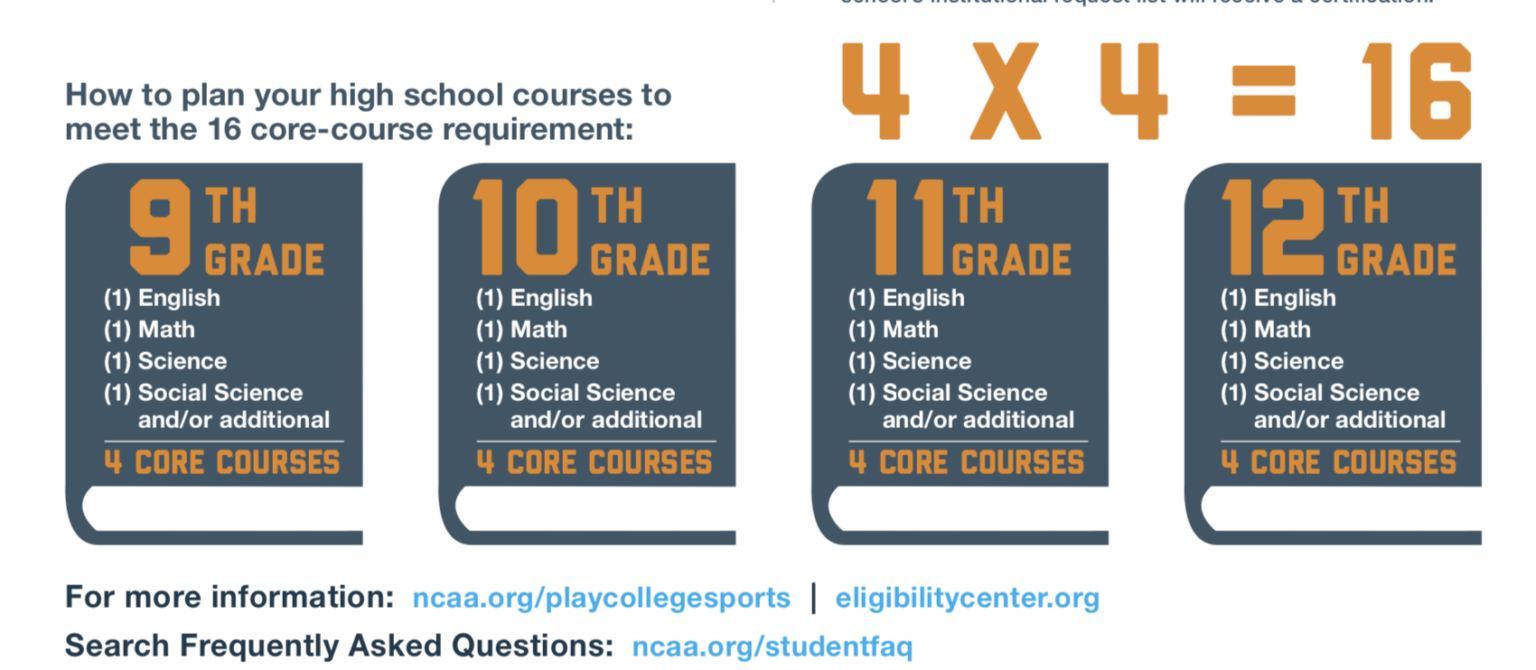
ACADEMIC REQUIREMENTS
-
If you want to play sports at an NCAA Division I or II school, start by registering for a Certification Account with the NCAA Eligibility Center at eligibilitycenter.org. If you want to play Division III sports or you aren’t sure where you want to compete, start by creating a Profile Page at eligibilitycenter.org.
- To play sports at a Division I or II school, you must graduate from high school, complete 16 NCAA-approved core courses, earn a minimum GPA and earn an ACT or SAT score that matches your core-course GPA.

CORE COURSES
-
Only courses that appear on your high school’s list of NCAA core courses will count toward the 16 core-course requirement; visiteligibilitycenter.org/courselist for a full list of your high school’s approved core courses. Complete 16 core courses in the following areas:
Division 1 - Complete 10 NCAA core courses, including seven in English, math or natural/physical science, before your seventh semester.
GRADE-POINT AVERAGE
The NCAA Eligibility Center calculates your grade-point average based only on the grades you earn in NCAA-approved core courses.
• DI requires a minimum 2.3 GPA.
• DII requires a minimum 2.2 GPA.
SLIDING SCALE
Divisions I and II use sliding scales to match test scores and GPAs to determine eligibility. The sliding scale balances your test score with your GPA. If you have a low test score, you need a higher GPA to be eligible. Find more information about test scores at ncaa.org/test-scores.
TEST SCORE
You may take the SAT or ACT an unlimited number of times before you enroll full time in college. Every time you register
for the SAT or ACT, use the NCAA Eligibility Center code 9999 to send your scores directly to us from the testing agency. We accept official scores only from the ACT or SAT, and won’t use scores shown on your high school transcript. If you take either test more than once, the best subscore from different tests are used to give you the best possible score

QUESTIONS TO CONSIDER ABOUT COLLEGES AND RECRUITING
QUESTIONS ABOUT THE COLLEGE
-
Is this a four-year or two-year school?
-
Is the school public or private?
-
Where is the school located?
-
Is this in the country, a small town, or in an urban area?
-
What is the campus like, compact or spread out?
-
How large is the school, what is the undergraduate enrollment?
-
What are the strongest degree programs offered, and which are the best academic departments?
-
Does the school have my potential major/career interests? It’s alright if you don’t know what you want to do as a career now - most people don’t
-
What is the growth potential for internships?
-
Do most students live on campus or in off-campus apartments?
-
What is student housing like?
-
Do the members of the soccer team room together?
-
What transportation is possible from my home to the campus? Bus, train, flight?
-
What is the academic calendar - quarters, semesters, trimesters?
-
What do you do to help players with their school work? Tutoring provided? Academic advisor?
-
If I’m not playing soccer, is this a school that I want to be at?
QUESTIONS ABOUT THE COLLEGE PROGRAM & TEAM
-
Does the school offer my major
-
In what division does the school play (NCAA I, II, III, NAIA, NJCAA)?
-
In what conference is the team?
-
What important non-conference teams are scheduled?
-
Do I want to start and play as a freshman?
-
What were the team’s conference and overall record this year?
-
How many players will there be on the roster next year?
-
How many players will travel with the team?
-
What training happens after the season?
-
What is the preseason schedule?
-
What is the practice schedule during the season? Morning, afternoon, night?
-
Including meetings, training, travel and matches, how much time is required?
-
What facilities and staff are available to take care of injuries and rehab?
-
What is the style of play you want to see?
-
What are your goals for the team?
QUESTIONS ABOUT THE COACH'S NEEDS FOR THE TEAM
-
How many seniors are graduating?
-
Are there redshirt players returning?
-
What positions do you have open on the team and where would I fit in?
-
How much playing time should I expect as a freshman?
-
How many other players are playing that position?
-
Are you recruiting other players for that position? Have you committed to any?
-
What role does the coach see you have within the team.
QUESTIONS TO ASK GOING FORWARD
-
Which tournaments will you be attending?
-
Will your school be hosting any ID clinics or camps that I can attend?
-
Have you talked to my coaches?
-
What’s the next step?
-
What should I do?
-
Do you see me as a serious candidate?
QUESTIONS TO ASK AFTER YOUR VISIT
-
How did I feel and how I liked the coach’s personality?
-
Do I feel his coaching style will mesh well with my playing style?
-
Is the school in my price range?
-
Did I enjoy the team members?
-
Did the school have what I wanted academically?
-
Is there growth potential within my major?
-
Do I like the campus? Was I comfortable?
-
If I’m not playing soccer, is this a school that I want to be at?
TIME MANAGEMENT BY DIVISION
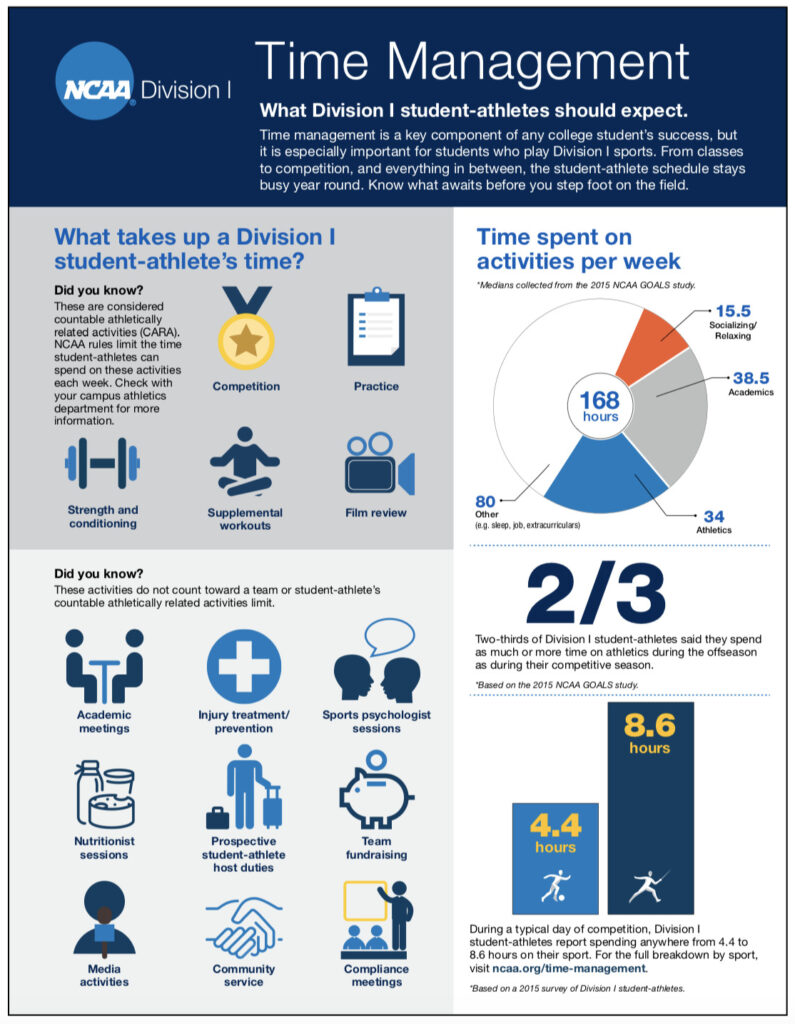
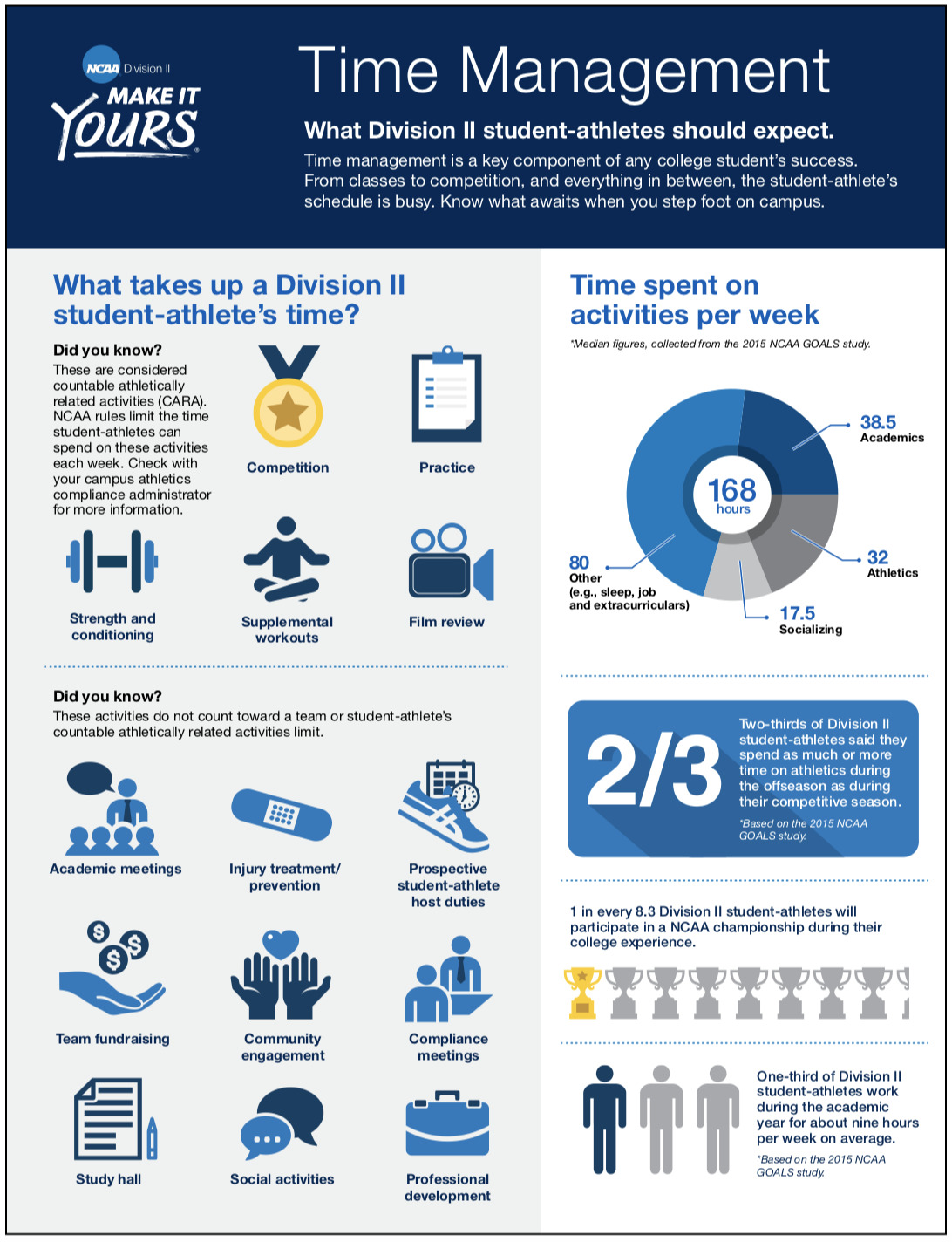
SLIDING SCALE
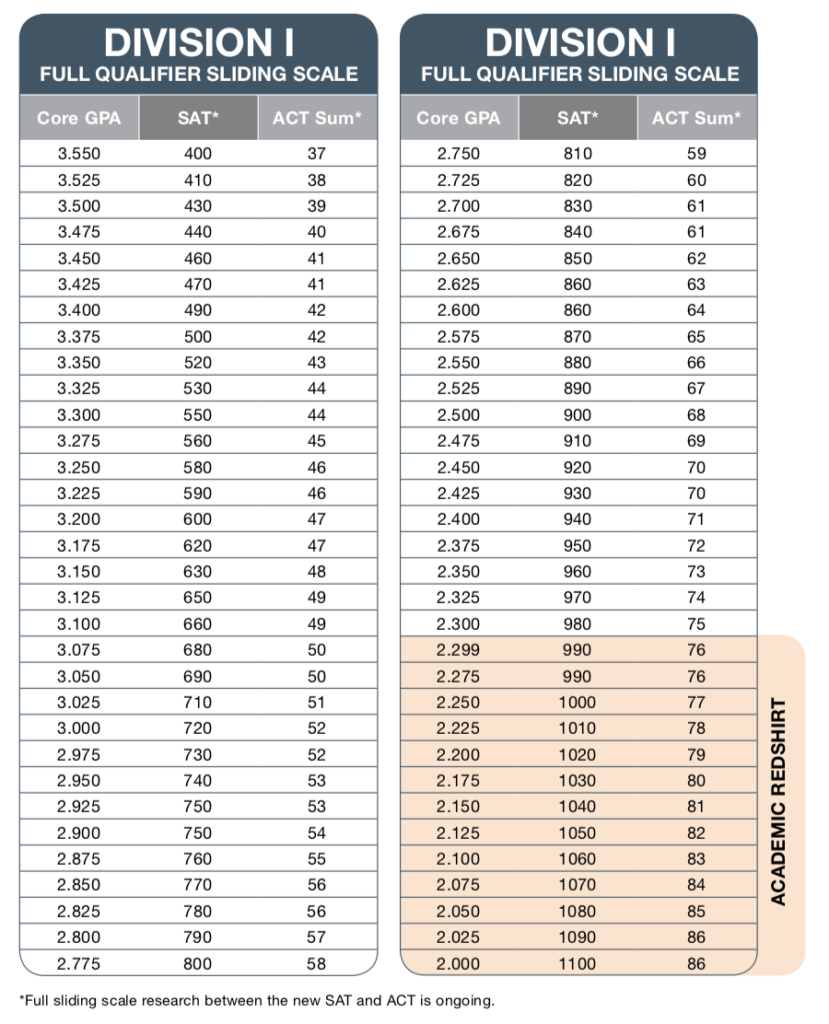
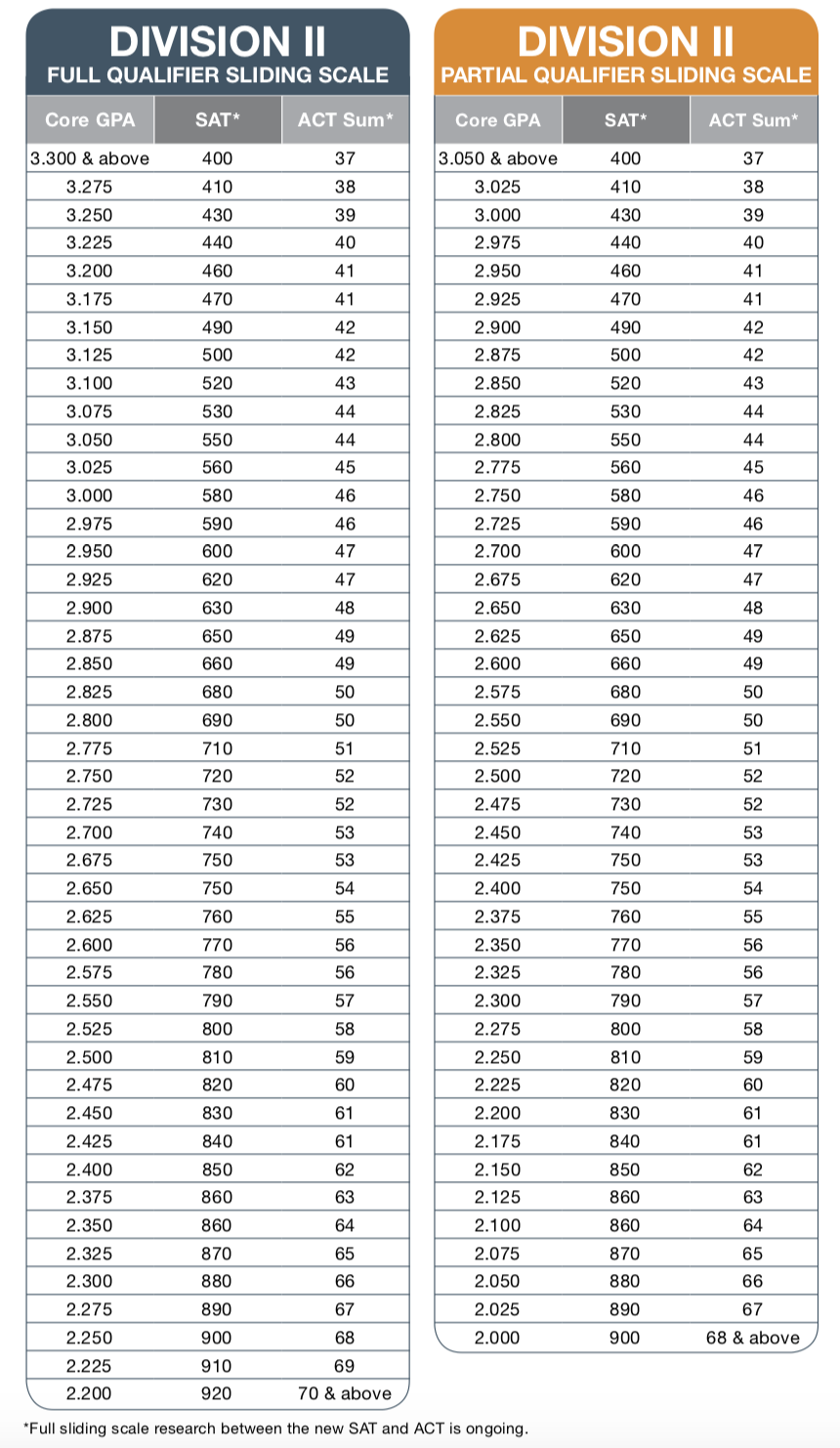
UPCOMING SAT / ACT TESTS DATES:
coming soon...
